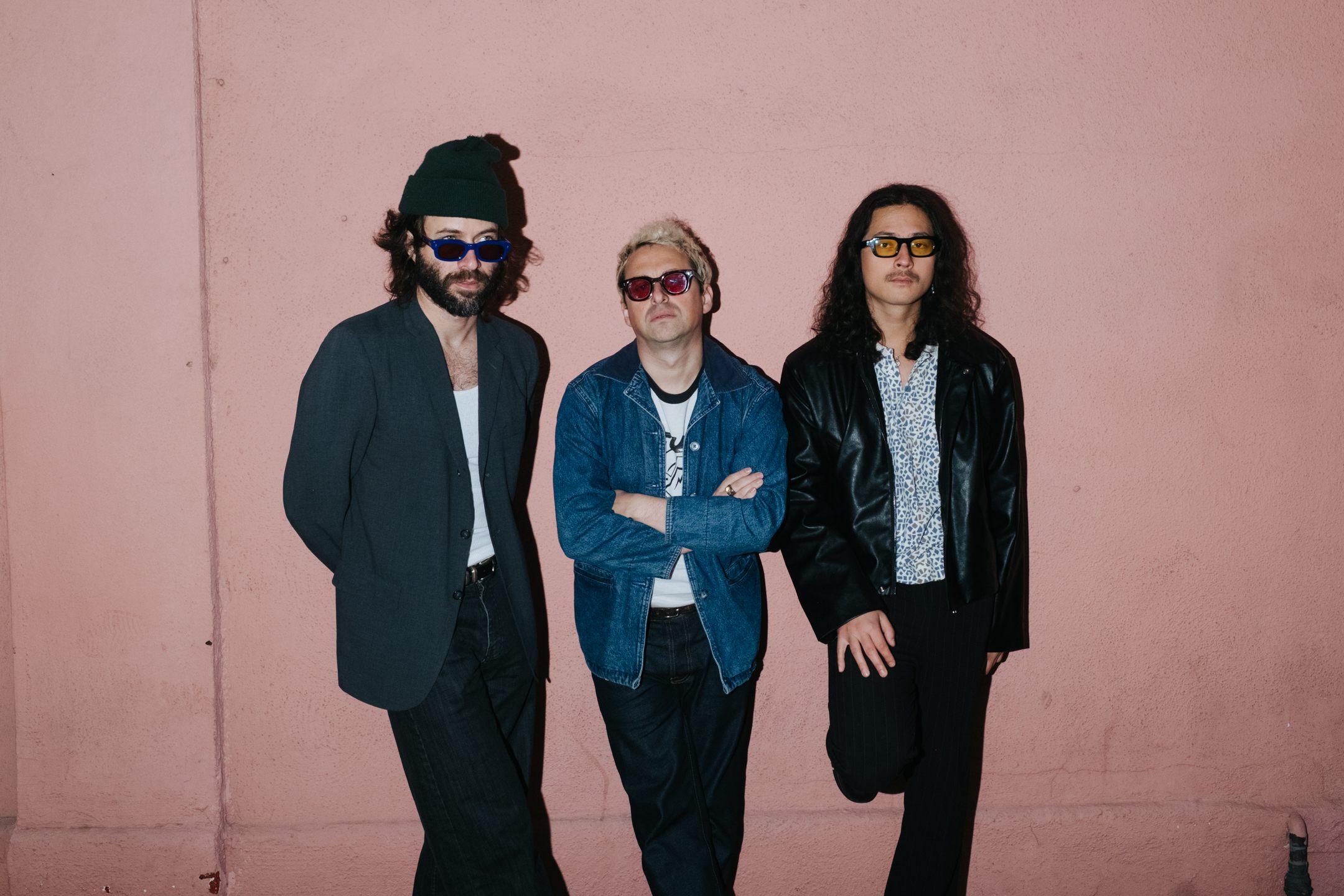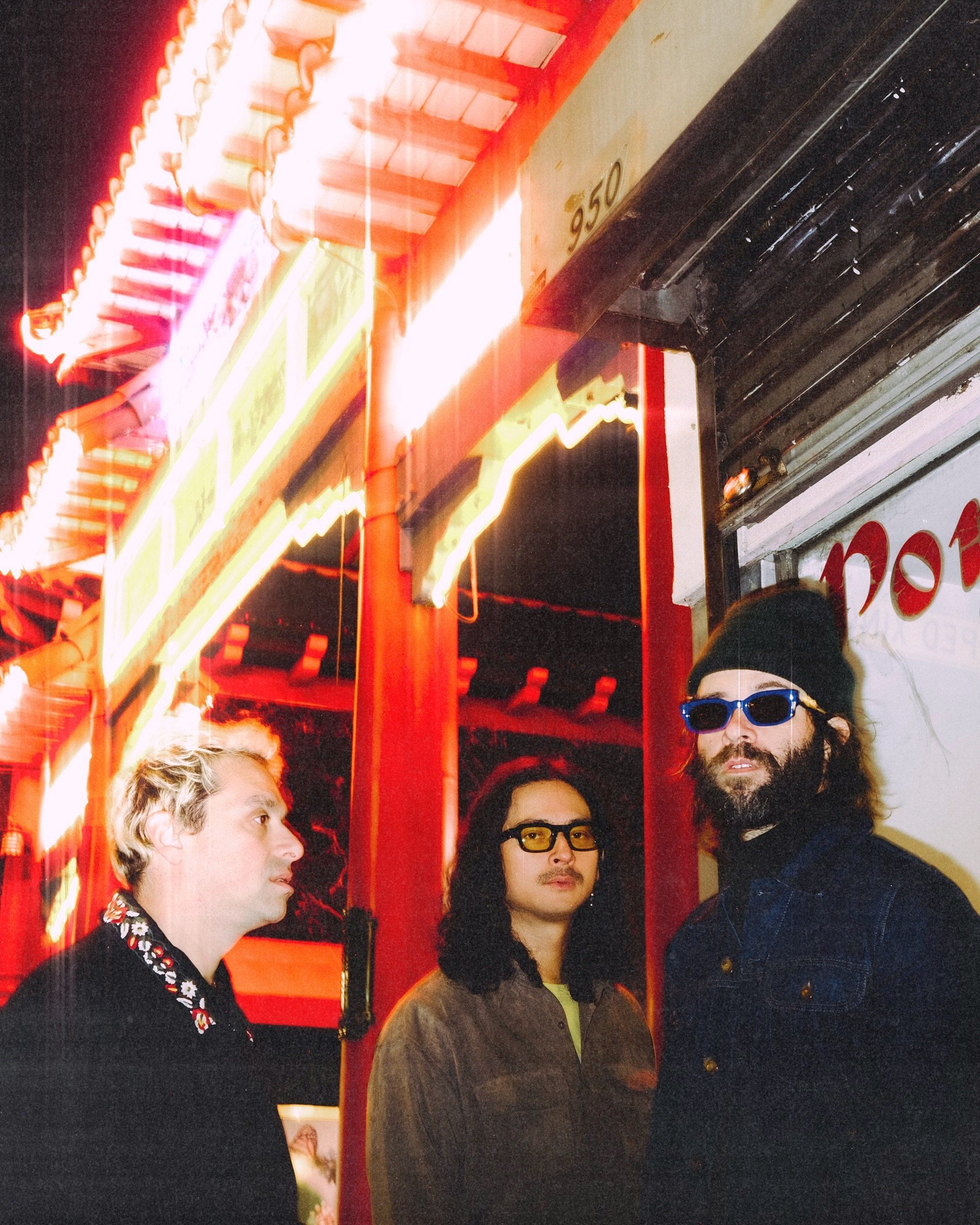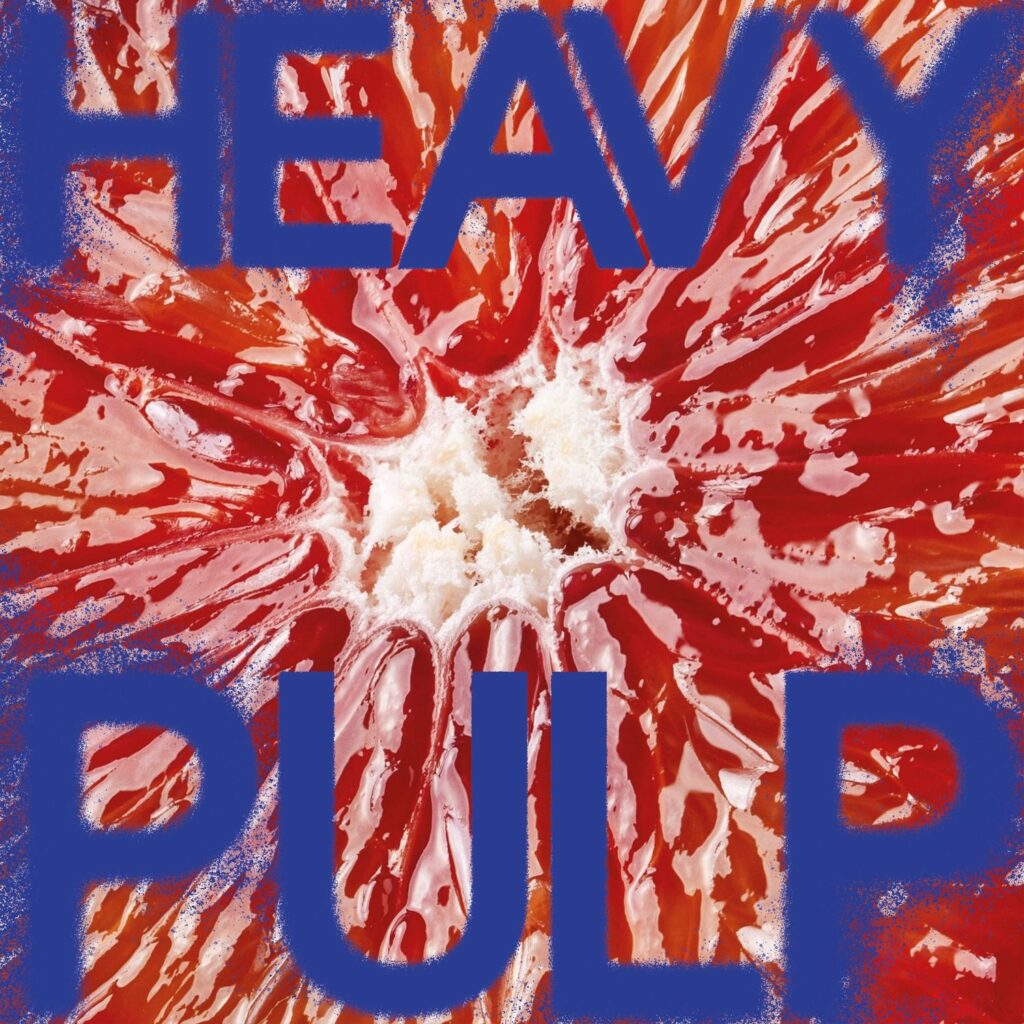I got the opportunity to listen to Heavy Pulp pre-release. It was late at night and I listened to the album thoroughly sitting in my car in the middle of a parking lot. I got chills after listening to every song, and immediately knew that I needed to talk to the lead singer of The Technicolors, Brennan Smiley. I wanted to know about the process of creating such a peculiar and original record. Every time I thought I had discovered the theme and sound for the rest of the record, I found myself confused at how different each track sounded from each other.
Find out about the creative process of Heavy Pulp below!

PHOTO: ERIC HALVORSEN
Angie: I know that the band has gone through a lot of changes, and I just wanted to know how would you say the writing and recording process was compared to your previous albums?
Brennan: It actually started out kind of similar, which is kinda just me and Sean dreaming up ideas, or I’ll have an idea and bring it to him and vice versa, and that actually started like three years ago. So, we didn’t really take a break—we have tried to take breaks so many times and we just always end up starting a new idea, so even if we don’t end up finishing up quickly, we are always cooking stuff up. That was definitely the case for this album. But I think the recording part of it, as it evolved and was closer to recording, it felt like everything was all over the place at first and very scattered and we had more ideas than we had ever had for any album. I think we had like twenty songs and maybe like fifteen of those songs had lyrics and everything mapped out. So that was also different. In the past we’ve kinda just written the songs! Like if the record had eleven songs on it, those were all the songs we wrote for it. And we just kind of like… committed. We were like “Oh, we hope these are good!”
Angie: Well, they have been!
Brennan: Thanks! This time I think we just had this built over that because it was a long amount of time before we got to record. I think that was part of the reason, we just kept coming up with ideas. So, I think by the time we got to the recording part it was like a chase to figure out of all the ideas which one felt the most true to us. Whether if I can get behind them when I’m singing them, or when we’re in the studio we know that we will be able to feel good about working on them. And the other thing is really different is that our producer this time, Robert (who is incredible) was really good at helping us. We knew we didn’t wanna overthink stuff as much as we did on the last album because the last album was a pandemic record, so we had a lot of time to be very heady and we kinda intentionally did that. We edited a lot, and kind of worked really hard on taking that path. And this one was more like when you’re in the studio and ideas are floating around but there’s always these moments where someone says “Hey, we should try this!” or someone plays something and you see eyes go up—those little moments of natural happiness, we wanted to follow that and keep that and not change it and just roll with it.
Angie: That sounds so cool!
Brennan: I think that is the main difference! The initial writing wasn’t too different but as it evolved it took a different shape. You know?
Angie: Right, that is really interesting to hear because, conveniently, it’s a segway to my next question. I notice that you guys play a lot with different genres in this record.
Brennan: Yeah!
Angie: I noticed the transition between Gold Fang to Softcore and then Posh Spice to First Class to Nowhere and then Ta ta ta. You have the grungy guitars, and then you have a ballad and then dance, electronic. Was that intentional? Or was it a “let’s figure this out and then we’ll go from there” situation?
Brennan: I don’t know if we realized we were doing that as much, because we used to kinda be all over the place and we would try to fight it. Or we used to think of it as a negative thing, like “Ugh, can we just stick to one lane?” And I think this is the first time that we just embraced it. So, we didn’t really think about that the whole time and then afterwards we were just like “Oh, this is cool! A lot of different sounds happening!” So yeah, I think it wasn’t intentional but if there was intentionality towards something it was just trying to be ourselves and we love so many kinds of different music and we didn’t want to hide that. Even if it came off as dorky, we just wanted to try everything and turn it into songs that we liked.

PHOTO: ERIC HALVORSEN
Angie: Was it mostly you and Sean working on the album? Or was there someone else contributing?
Brennan: Me and Sean kind of started everything, and then when we were recording, we worked at a studio here in LA. Nathan from BRONCHO came here and played drums, which was also really cool because him and I have been very close friends for a while, and we have always been dreaming of playing music together. And it so happened that we both got to cross each other’s paths, like the timing was just very kindred. So, he came out, Nico, our bass player came out from Toronto, Kim Vi, our keys player who lives in LA too, and Sean—we all got in a room together for like two weeks and that was also really nice. To have a dedicated chunk of time to work on an album together in the studio.
Angie: Yeah! When you told me about you guys being friends it all just made sense! You can kind of, not only see but hear the chemistry that you guys have. Rhythmically it just makes sense.
Brennan: Awesome, that’s really cool to hear.
Angie: Yeah! Talking about inspirations, I heard a lot of indie influences on the record. Considering that Nathan from BRONCHO was there and that you were touring with them and you have been a fan of their music for some time. Also, Sean Silverman being part of Beach Weather, would you say that that has influenced your sound in any way?
Brennan: No.
Angie: Hahahaha not at all?
Brennan: Hahaha no, I mean, BRONCHO… There’s something about that band. I’m sure you know too. There is something about their music that is just so sweet to my soul. I just love it. I’m a melody person! I just really connect to the melody before I… I still don’t know the words to some BRONCHO songs that I’m singing on!
Angie: I get that!
Brennan: Language isn’t really important to me when it comes to music, or it’s not as important to me for the most part. And there’s always something melodically about BRONCHO’s stuff that we’ve always loved. We obviously have influences, and we, as a band, used to talk about tour influences a little bit more, and now it’s kinda like we’ve just fallen into our own world.
Angie: Now you are the influence.
Brennan: We try to be! It’s not like we are so amazing we don’t need influences! It’s just that I don’t think we think that way as much anymore, and I think that is kinda normal for artists and bands. When you start out you kinda try to find your identity by mimicking and bouncing off of your heroes. As you keep continuing to do it you just kinda naturally fall into your own world. You’re like “Oh, I’ve built my own thing!” It’s impossible for me to know what my own thing is. BRONCHO has been in my life for a long time as friends, and a lot of the bands that come out of the Oklahoma scene too. I used to live in Oklahoma for a little bit, and I had known Nathan before that, but that’s where I got acclimated with that sneaky, cool scene in Oklahoma. I get really inspired by people believing in what they are doing and that seems to happen a lot out there. There’s something in the water. It’s a pretty cool little zone.
Angie: That’s awesome. I’m gonna have to check out some more bands from there. I think the only one I know is BRONCHO!
Brennan: Have you heard about Sports? They are really cool. Jaco Jaco who’s opening for us in New York used to be in that band. He is one of the brothers and he is doing his own thing now and it’s very amazing. His new record is awesome.
Angie: I will definitely check it out! I am also a huge fan of the visuals and the aesthetic that you’re using for Heavy Pulp. I feel like the concept in general is very vibrant. Was this, again, on purpose? How did you come up with it? Was there anything that inspired you?
Brennan: Now that was on purpose! I think we just wanted something loud and pulpy, as we like to say. Just kinda like bursty, I think. That’s how we felt when we were in the studio. Excited, bursty. Not quite explosive, like a fruity explosion, like a kool-aid commercial. That kind of explosion.
Angie: Hahahaha.
Brennan: Hahaha yeah! I think Raissa [Pardini] our artist, she did all the artwork for our LP and the cover, and she was really great to work with. She was the perfect person for it. We had looked at her work and it was incredible. And she’s from the UK and has worked with a lot of cool people. She just nailed that. It was a fun process and just cool to see how her mind works. And all the video visuals were inspired by that, so once we had the album artwork, we felt that we had this really awesome—not really just by looking at it, like the colors—it was more of a feeling that I got from seeing all the things that she had done. It kinda felt like she was helping to add another layer of paint to this little album world that we were creating. And then for the video visuals we had our friend Lupe, he’s an amazing photographer and he shot a couple videos for us. And then we would either use those, or I would chop them up and make stuff out of them. Eric, our other friend who’s playing bass with us, took some photos and shot the video for I Miss My Friends. So, this whole thing was all friends, which I feel really lucky that we were able to do it like that and have so much community around the project. It’s the best way to do things if you can.

Angie: Yeah, it makes it a little more personal too, I think. It’s not just a record but memories, and anecdotes.
Brennan: You’re totally right, yeah. And that was really important to me before we even recorded. I wanted to make sure we would all be in the same place together. Sean and I have worked remote on songs and projects and it’s not that its bad, it can open up a really cool process. We had done that a lot on the last record, so it was really important to me to have everyone in the same place together, that was one of the reasons why it took us so long to get in the studio. Because of everyone’s schedules. We had to wait a little bit longer to do all that.
Angie: It’s not the same through a screen. I feel like, if you’re talking about music, yeah it can happen, but if it’s in person I feel like there’s more connection. Again, it feels more personal.
Brennan: Definitely, and that’s important. As life gets weirder and weirder and weirder… that connection is really valuable.
Angie: Definitely. I have two more questions. I struggle a lot with writer’s block, especially if I haven’t written in a long time. And although you said that you’ve been working on this for many years behind the curtains, did you come across any difficulties writing Heavy Pulp? What was the hardest song to work on?
Brennan: Yes. I definitely do have that problem sometimes, the one that comes to mind is Aphantasia. But that came out of a period of struggle. I wasn’t really struggling with it; it came pretty quickly. But it’s sort of about not being able to access your imagination and feeling like life kinda beat the imagination out of me, and knowledge kinda took the place of my imagination. And then the algorithms and the having technology ease everywhere—constant stimulation. And “aphantasia” means “no imagination” or lack thereof, and I liked that word! I liked the notion of what would it be like to not be able to imagine anything. And I don’t even know what the song is about, I think it’s kind of about a lot of things. There’s not really like a lyrical point to it, it’s just this thing that happened after this struggle. Me sitting in my little room trying to write a song and trying to have that feeling, and nothing happening. Whether if it’s on guitar, with words… And at some point, I just found these three chords and they made me feel a little bit of something and I just kinda started messing around with some ideas and I thought it was terrible, and I sent it to the guys, and they really liked it!
Angie: Yeah! It’s a really good song; I really liked it. It’s one of my favorites, probably my second favorite off the album.
Brennan: I love it too. If there is a meaning to the lyrics “you’re never gonna lose me if you never let go” it’s kind of about my relationship with my creative side, my creative self. Don’t let go of things that make you feel young and childlike. Coming back across that notion helped spark that, but it definitely came out of this period where I felt empty, and my best read of those when I have problems doing what I do, playing guitar or writing or whatever… I just feel like it’s a patience thing. You kinda have to wait it out. It’s easier said than done though.
Angie: Yeah. I also want to know what’s the song that you’re most excited for everyone to hear?
Brennan: I don’t know if I “want” but I love Aphantasia. Maybe Chump Change.
Angie: It’s so good! That’s my favorite one! That’s my number one!
Brennan: Awesome, that fires me up. Thank you. That one is kind of about the arc of the starving artist and my relationship with money—somewhere along the lines of that, you know? That was another one! I wrote that one right after Aphantasia. Kind of like I was on a roll. The juices are flowing again.
Angie: Heavy Pulp.
Brennan: The pulp is back in the juice. And that one also kinda shook the “take it seriously” —any part of me that wanted to take something seriously, I need to shake it off.
Angie: Yeah, you did a great job with that one.
Brennan: Thank you, thank you. I’m glad you dig it.
Angie: And I’m sure everyone is gonna like it. I have a couple of friends in mind that I’m gonna send the song to. Congratulations on Heavy Pulp!